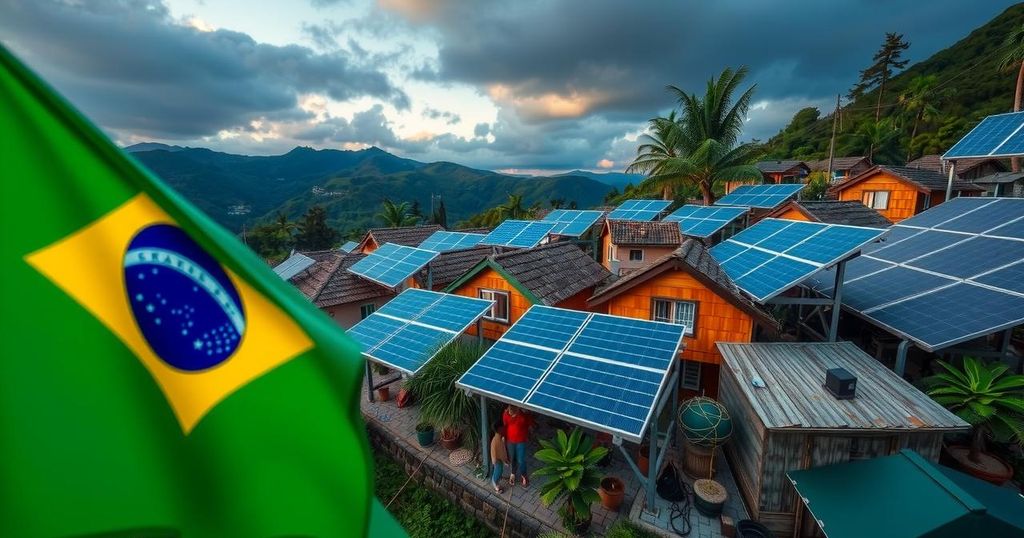Cars
ABVE, AMAZONAS, ASIA, BEIJING, BELO MONTE, BRASILIA, BRAZIL, BRAZILIAN ELECTRIC VEHICLE ASSOCIATION, BY, BYD, CEARA, CHINA, CHINA STATE POWER INVESTMENT CORPORATION, ENERGY, FELIPE CAMARGO GAIOTTO, GREEN HYDROGEN, INDUSTRY, MANAUS, MEXICO, NORTH AMERICA, PANATI, PEOPLE ' S DAILY, RENEWABLE ENERGY, RIO DE JANEIRO, SAO PAULO, SOUTH AMERICA, SPIC, STATE GRID CORPORATION OF CHINA
Amira Khan
0 Comments
China-Brazil Partnership Advances Green Energy and Electric Mobility Solutions
China and Brazil have established a successful green cooperation, exemplified by the Panati photovoltaic power station in Ceara, which supplies clean energy to over 350,000 households. The two countries collaborate on various renewable projects, including ultra-high-voltage transmission systems, to enhance energy accessibility. Additionally, the increasing adoption of electric vehicles, particularly brands from China, highlights the growing impact of green technologies in Brazil.
The Panati photovoltaic power station in Ceara, Brazil, represents a significant step in green energy cooperation between China and Brazil, as it harnesses the power of 446,000 solar panels over an expansive area of 840 hectares. Established by the Brazilian branch of the China State Power Investment Corporation (SPIC), this facility began operations in June 2024 and now supplies clean energy to more than 350,000 households annually. This development highlights Brazil’s commitment to a green energy transition, fostering collaboration with China in this vital arena. Furthermore, the State Grid Corporation of China has played an essential role in transmitting renewable energy sources through its successful implementation of multiple ultra-high-voltage transmission projects, aiding the connection of the hydroelectric resources from Brazil’s north to its densely populated southeast. In December 2023, the State Grid secured franchise rights for a new project that will deliver wind and solar energy from northeastern Brazil to the capital, Brasilia. In addition to advancements in energy production, electric transportation is gaining momentum in Brazilian cities such as Sao Paulo and Rio de Janeiro. Recent sales figures reveal that over 120,000 light electric vehicles were sold in Brazil in the first three quarters of this year, indicating a remarkable increase of 113 percent compared to the previous year, with a substantial portion of these vehicles being produced by Chinese manufacturers. The establishment of a battery production facility in Manaus by BYD, a leading Chinese new energy vehicle manufacturer, signifies a key development in Brazil’s electric mobility sector, bolstering local production capabilities and promoting the integration of green technologies into public transportation.
The topic of China-Brazil green cooperation revolves around the mutual efforts between the two nations to enhance renewable energy production and usage. Brazil’s rich experiences in hydropower, combined with China’s advancements in solar, wind, and electricity transmission technologies, create avenues for significant partnership in sustainable energy development. This collaboration not only addresses local energy needs but also aligns with global sustainability goals, contributing positively to the fight against climate change.
In summary, the collaboration between China and Brazil in green energy initiatives is yielding substantial benefits, as demonstrated by the successful operation of the Panati photovoltaic power station and the ongoing ultra-high-voltage transmission projects. The rise in electric vehicle sales further accentuates the impact of this partnership, paving the way for a sustainable future driven by renewable energy sources and improving public transportation infrastructure through local production. This alliance not only enhances energy security in Brazil but also sets a precedent for global efforts to tackle climate change through innovative technology and international cooperation.
Original Source: www.cnhinews.com




Post Comment